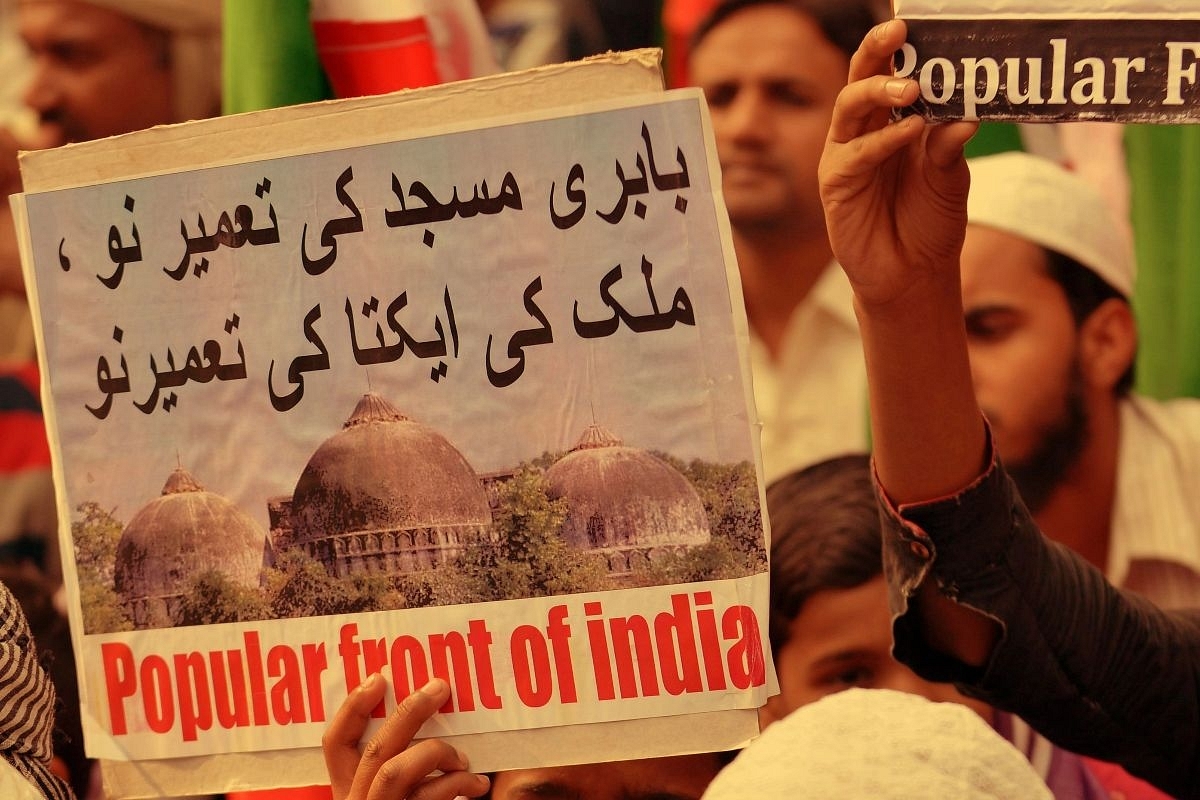Context
PFI Crackdown: Questions To Consider For The Thinking Indian Muslims

Popular Front Of India (PFI). (Representative image)
The nationwide crackdown on PFI, a radical Islamist outfit, brings an opportunity to introspect and choose a course forward.
Context: In the intervening night of Wednesday and Thursday, a multi-agency operation conducted searches and raids across the country.
The raid against the Popular Front of India (PFI) was spearheaded by the NIA, ED, and state police forces.
Arrests galore: Over a 100 PFI functionaries were arrested for their alleged support to terror activities.
Those apprehended include PFI chairman O M A Salam, national secretary Nasaruddin Elamaram, and Kerala unit president C P Mohammed Basheer.
The maximum number of arrests were made in Kerala (22).
20 PFI functionaries were taken into custody each from Maharashtra and Karnataka.
Arrests were also made in Tamil Nadu (10), Assam (9), Uttar Pradesh (8), Andhra Pradesh (5), Madhya Pradesh (4), Delhi (3), Puducherry (3), and Rajasthan (2).
The operation was their "largest-ever investigation process so far."
On the radar: Home Minister Amit Shah, NSA Ajit Doval, Union Home Secretary Ajay Bhalla, NIA director Dinkar Gupta, and other agency chiefs were closely monitoring the operation.
The PFI was under the scanner of central agencies for quite some time.
Their involvement was alleged in the CAA-NRC protests, the Delhi riots, and the Karnataka hijab controversy.
PFI functionary Siddique Kappan was arrested in 2020 and charged under UAPA in the Hathras incident.
The organisation also reportedly played a role in the nationwide unrest following the Nupur Sharma controversy.
The PFI's response after the arrests was along expected lines.
They criticised the central government for "using agencies to silence dissenting voices."
PFI Kerala state general secretary A Abdul Sattar said "any attempt to ban the Popular Front of India will be met with strong resistance," adding that the NIA was "implementing RSS agenda."
PFI called for a "dawn-to-dusk hartal" in Kerala, its stronghold.
Visuals from the hartal showed state transport buses being attacked in Alappuzha, Kozhikode, and Wayanad, in Kerala.
Time for introspection: No honest, thinking Muslim can ignore what's happening right before their eyes.
They need to ask themselves a basic question: Is a narrow interpretation of Islamic law compatible with an open society?
For instance, can everything from the Quran, the Sunnah, and the Hadith be applied to India?
Whether it's time to de-emphasise certain things that are not relevant to a pluralistic society — this needs to be looked at.
Hatred for the other is sadly a striking feature when one goes through Islamic scriptures.
Pejorative references to non-Muslims as kafirs, the extolling of ghazis, and the categorising of countries as Dar-al-Islam and Dar-al-Harb based on the religion of the ruler go against peaceful coexistence.
Isolation of the Muslim community into ghettos and then letting organisations like Tablighi Jamaat radicalise young Muslims is a recipe for unrest.
Alignment with the Ummah, the global Islamic community, even when it goes against India's interests vitiates relationships with people from other communities.
Whether it's jumping to protect Aurangzeb, Tipu Sultan, Khiljis, or other Muslim invaders, Indian Muslims have to answer: Why protect and celebrate Muslim bigots?
Isolation breeds distance. Does locking oneself into ghettoes and creating no-go zones for the police help end this self-imposed isolation and fear of contamination by other faiths?
Seeking separate civil laws, broadcasting the azan five times a day even in crowded neighbourhoods, and offering namaz on public roads are already routine practice.
Still, victimhood is presumed by the Muslim community, with a desire to stretch religious rights further.
This prevents a fair and sensible discussion around eradication of Muslims' woes.
Bottom line: Introspection along these lines will determine whether Indian Islam can become compatible with India’s plural and open society.
Adapted from R Jagannathan's article.
Support Swarajya's 50 Ground Reports Project & Sponsor A Story
Every general election Swarajya does a 50 ground reports project.
Aimed only at serious readers and those who appreciate the nuances of political undercurrents, the project provides a sense of India's electoral landscape. As you know, these reports are produced after considerable investment of travel, time and effort on the ground.
This time too we've kicked off the project in style and have covered over 30 constituencies already. If you're someone who appreciates such work and have enjoyed our coverage please consider sponsoring a ground report for just Rs 2999 to Rs 19,999 - it goes a long way in helping us produce more quality reportage.
You can also back this project by becoming a subscriber for as little as Rs 999 - so do click on this links and choose a plan that suits you and back us.
Click below to contribute.
Latest